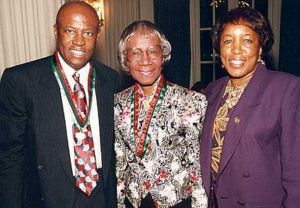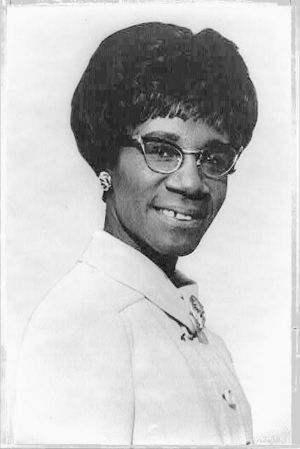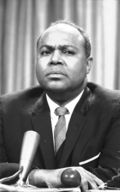Shirley Chisholm: Difference between revisions
imported>Yi Zhe Wu (typo) |
imported>Yi Zhe Wu (→Congressional career: tweak) |
||
| Line 1: | Line 1: | ||
[[Image:Sachisholmmodified.jpg|right|thumb|Shirley Chisholm]] | [[Image:Sachisholmmodified.jpg|right|thumb|Shirley Chisholm]] | ||
'''Shirley Anita Chisholm''' (1924-2005) was an [[United States|American]] political figure who served in the [[House of Representatives]] from 1969 to 1983, representing [[New York]]'s | '''Shirley Anita Chisholm''' (1924-2005) was an [[United States|American]] political figure who served in the [[House of Representatives]] from 1969 to 1983, representing [[New York]]'s 12th Congressional District. She was the first [[African-American]] woman to serve as a [[United States Congress|congress]]man in the United States. Chisholm was a member of the [[Democratic Party]]. She unsuccessfully ran for the Democratic nomination for [[U.S. Presidents|presidency]] in 1972. During her colorful and controversial career, Chisholm was renowned for her political [[liberalism]] and her advocacy of rights and equality for the underprivileged people, such as African-Americans, the poverty-stricken, and women. | ||
==Early life and career== | ==Early life and career== | ||
| Line 13: | Line 13: | ||
Chisholm ran for Congress in 1968 on the Democratic ticket with the slogan "unbought and unbossed". Her opponent from the [[U.S. Republican Party|Republican Party]] was [[James L. Farmer]], the famous civil rights leader and founder of [[Congress of Racial Equality]]. She won the election and was re-elected six times. | Chisholm ran for Congress in 1968 on the Democratic ticket with the slogan "unbought and unbossed". Her opponent from the [[U.S. Republican Party|Republican Party]] was [[James L. Farmer]], the famous civil rights leader and founder of [[Congress of Racial Equality]]. She won the election and was re-elected six times. | ||
In Congress, she was known for her outspokenness and uncompromising style. She focused on issues such as [[poverty]], [[civil rights]], and [[women's rights]]. She was a founding member of the [[Congressional Black Caucus]]. In 1970, she authored a [[child care]] bill. The bill passed the House and the Senate, but was vetoed by President [[Richard Nixon]], who called it "the Sovietization of American children".<ref> [http://www.now.org/press/01-05/01-03.html NOW Honors Guts and Glory of Shirley Chisholm] </ref> She supported the [[Equal Rights Amendment]] and legalized [[abortion]].<ref> [[http://www.britannica.com/women/article-9002495 Britannica's Guide to Women's History] </ref> | In Congress, she was known for her outspokenness and uncompromising style. She focused on issues such as [[poverty]], [[civil rights]], and [[women's rights]]. She was a founding member of the [[Congressional Black Caucus]]. In 1970, she authored a [[child care]] bill. The bill passed the House and the Senate, but was vetoed by President [[Richard Nixon]], who called it "the Sovietization of American children".<ref> [http://www.now.org/press/01-05/01-03.html NOW Honors Guts and Glory of Shirley Chisholm] </ref> She supported the [[Equal Rights Amendment]] and legalized [[abortion]] of unborn embryos or fetuses.<ref> [[http://www.britannica.com/women/article-9002495 Britannica's Guide to Women's History] </ref> | ||
In the area of national security and foreign policy, Chisholm worked for the revocation of [[Internal Security Act of 1950]].<ref> [http://www.democracynow.org/article.pl?sid=03/04/07/024249 Democracy Now! radio station news] </ref> She also opposed the American involvement in the [[Vietnam War]]. | In the area of national security and foreign policy, Chisholm worked for the revocation of [[Internal Security Act of 1950]].<ref> [http://www.democracynow.org/article.pl?sid=03/04/07/024249 Democracy Now! radio station news] </ref> She also opposed the American involvement in the [[Vietnam War]]. | ||
| Line 19: | Line 19: | ||
===Presidential bid=== | ===Presidential bid=== | ||
She entered the bid for Democratic nomination for presidency in 1972 election, becoming the first African-American woman to run for president. However, she only | She entered the bid for Democratic nomination for presidency in 1972 election, becoming the first African-American woman to run for president. However, she only obtained 152 votes from the delegates in the Democratic convention and the nomination was won by [[George McGovern]], a Senator from [[South Dakota]], who went to lose in the general election to then-President Richard Nixon. | ||
In his presidential campaign, she highlighted her efforts in Congress to introduce day care legislations, to establish a minimum annual income for families, to bring back the troops from [[Vietnam]], and her record against installation of missiles such as MIRV and ABM. In the campaign brochure she promised reforms and styled her presidential bid as a "dynamic force for responsible change".<ref> [http://www.4president.org/brochures/shirelychisholm1972brochure.htm Shirley Chisholm for President 1972 Campaign Brochure] </ref> | In his presidential campaign, she highlighted her efforts in Congress to introduce day care legislations, to establish a minimum annual income for families, to bring back the troops from [[Vietnam]], and her record against installation of missiles such as MIRV (multiple independently-targeted reentry vehicles) and ABM ([[antiballistic missile]]). In the campaign brochure she promised reforms and styled her presidential bid as a "dynamic force for responsible change".<ref> [http://www.4president.org/brochures/shirelychisholm1972brochure.htm Shirley Chisholm for President 1972 Campaign Brochure] </ref> | ||
==Later life== | ==Later life== | ||
Revision as of 15:49, 10 June 2007
Shirley Anita Chisholm (1924-2005) was an American political figure who served in the House of Representatives from 1969 to 1983, representing New York's 12th Congressional District. She was the first African-American woman to serve as a congressman in the United States. Chisholm was a member of the Democratic Party. She unsuccessfully ran for the Democratic nomination for presidency in 1972. During her colorful and controversial career, Chisholm was renowned for her political liberalism and her advocacy of rights and equality for the underprivileged people, such as African-Americans, the poverty-stricken, and women.
Early life and career
Shirley Chisholm was born in 1924 in Brooklyn, New York. She obtained early education in Barbados, her parents' homeland, and later attended New York public schools.[1] She obtained her bachelor's degree at Brooklyn College and, a master's degree at Columbia University in elementary education. She taught at a nursery school and later became the director of Hamilton-Madison Child Care Center in New York City. During her career in education she advocated for decentralization of policies on schools. She served in the New York state legislature from 1964 until her election to the U.S. Congress in 1968.
Congressional career
Chisholm ran for Congress in 1968 on the Democratic ticket with the slogan "unbought and unbossed". Her opponent from the Republican Party was James L. Farmer, the famous civil rights leader and founder of Congress of Racial Equality. She won the election and was re-elected six times.
In Congress, she was known for her outspokenness and uncompromising style. She focused on issues such as poverty, civil rights, and women's rights. She was a founding member of the Congressional Black Caucus. In 1970, she authored a child care bill. The bill passed the House and the Senate, but was vetoed by President Richard Nixon, who called it "the Sovietization of American children".[2] She supported the Equal Rights Amendment and legalized abortion of unborn embryos or fetuses.[3]
In the area of national security and foreign policy, Chisholm worked for the revocation of Internal Security Act of 1950.[4] She also opposed the American involvement in the Vietnam War.
Presidential bid
She entered the bid for Democratic nomination for presidency in 1972 election, becoming the first African-American woman to run for president. However, she only obtained 152 votes from the delegates in the Democratic convention and the nomination was won by George McGovern, a Senator from South Dakota, who went to lose in the general election to then-President Richard Nixon.
In his presidential campaign, she highlighted her efforts in Congress to introduce day care legislations, to establish a minimum annual income for families, to bring back the troops from Vietnam, and her record against installation of missiles such as MIRV (multiple independently-targeted reentry vehicles) and ABM (antiballistic missile). In the campaign brochure she promised reforms and styled her presidential bid as a "dynamic force for responsible change".[5]
Later life

Chisholm did not run for re-election in 1982, and retired from Congress. From 1983 to 1987 she taught politics and women's studies at Mount Holyoke College. In 1985 she was a visiting scholar at Spelman College. In 1984 and 1988, she campaigned for Jesse Jackson for the presidential elections. In 1993, then-President Bill Clinton nominated her to the ambassadorship to Jamaica, but she could not serve due to poor health. She died in Florida in 2005.
She had married twice in her life. Her first husband, Conrad Q. Chisholm, a Jamaican private investigator, whom she married in 1949, divorced her in 1977. She married Arthur Hardwick, Jr. in 1978. Hardwick died in 1986.[6]
Sources
Citations
General references
- Congressional Biographical Directory
- FamilyEducation
- Associated Content biography
- Department of State
- African-Americans
Further reading
- Chisholm, Shirley, Unbought and Unbossed, (Boston, Houghton Mifflin, 1970) ISBN 0395109329
- Hicks, Nancy, The Honorable Shirley Chisholm, Congresswoman from Brooklyn, (New York, Lion Books, 1971) ISBN 087460236X
- Scheader, Catherine, Shirley Chisholm: Teacher and Congresswoman, (Hillsdale, NJ, Enslow Publishers, 1990) ISBN 0894902857

